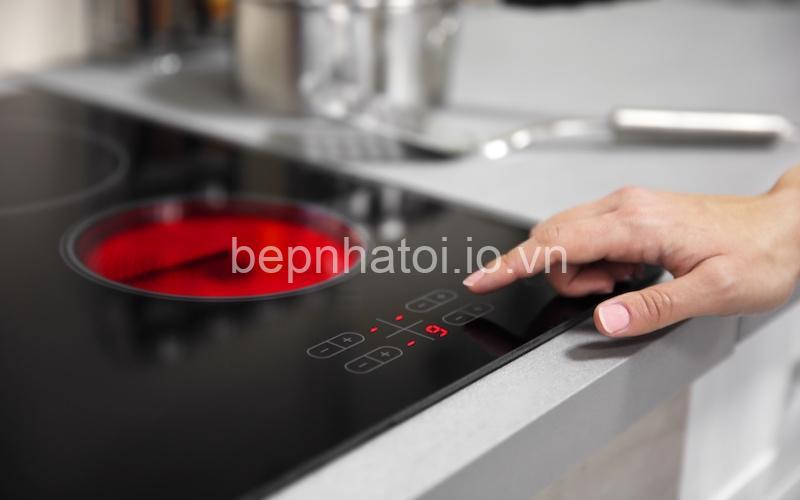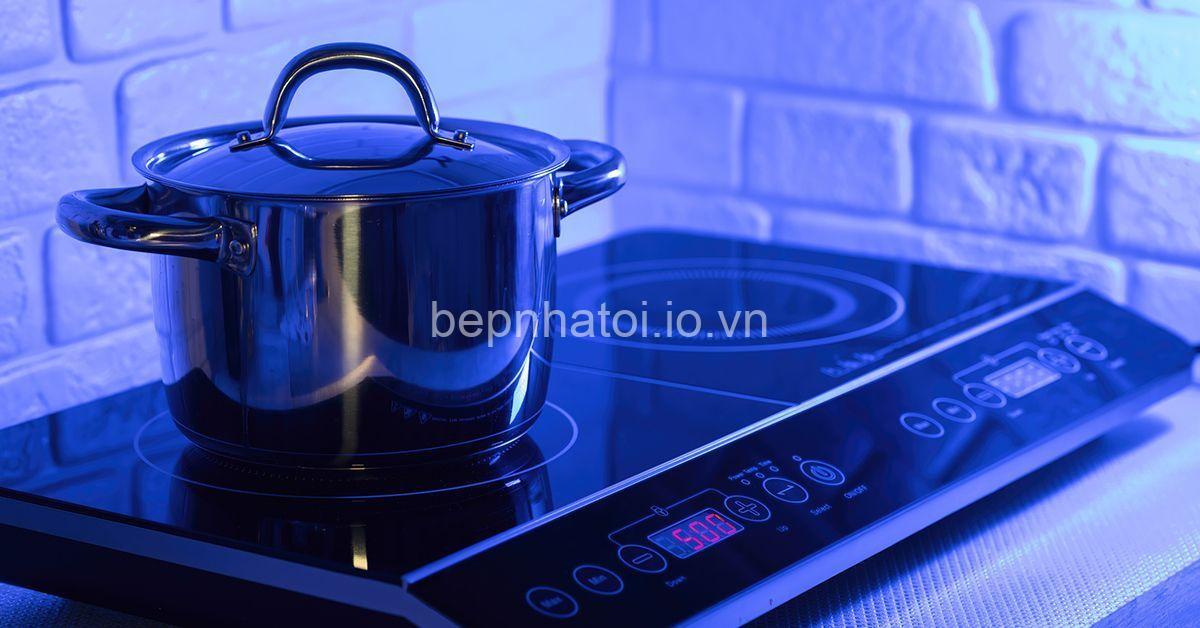
Electric Stoves: How They Work, Pros & Cons – bepnhatoi.io.vn. In today’s article, bepnhatoi.io.vn will explore with you in the most detailed and complete way. See now!
Understanding the Fundamentals of Electric Stoves
How does an electric stove work?
An electric stove utilizes electricity to generate heat for cooking. This process involves converting electrical energy into thermal energy through heating elements. These elements come in various forms, each with unique properties and advantages.
- Coil Heating Elements: These are the most common type, often found in older electric stoves. They consist of coiled wires that heat up when electricity passes through them. Coil heating elements are relatively affordable but can take slightly longer to heat up.
- Radiant Heating Elements: Radiant heating elements use a ceramic surface that glows red when heated. This heat is then radiated onto the cookware, providing a more even and efficient heating experience.
- Halogen Heating Elements: Halogen heating elements are known for their rapid heating capabilities. They combine a halogen gas and a coiled wire, allowing them to heat up quickly and deliver intense heat.
- Ceramic Heating Elements: Ceramic heating elements provide a smooth, easy-to-clean surface. They heat up quickly and offer precise temperature control, making them a popular choice for modern electric stoves.
Types of Electric Stoves
Electric stoves are available in various designs to suit different kitchen layouts and preferences.
- Free-Standing Stoves: These stoves are independent units that stand on their own. They are typically found in traditional kitchens and offer a versatile setup. Free-standing stoves are generally more affordable than other types and often come with a variety of features.
- Slide-In Stoves: Slide-in stoves are designed to fit seamlessly into a countertop cutout. They typically have a flush-mount design, creating a modern and streamlined look. Slide-in stoves are generally more expensive than free-standing stoves but offer a more integrated appearance.
- Drop-In Stoves: Drop-in stoves are similar to slide-in stoves, but they are installed into a countertop cutout from below. This provides a flush look with a more customizable installation process.

The Advantages of Electric Stoves
Electric stoves offer several advantages over gas stoves, making them a popular choice for many homeowners.
- Precise Temperature Control: Electric stoves allow you to control the heat output with great precision. This is essential for delicate cooking tasks, baking, and maintaining even temperatures.
- Enhanced Safety: Electric stoves generally pose a lower risk of accidental fires compared to gas stoves. There is no open flame, reducing the chance of ignition hazards.
- Easy Cleaning: The smooth surface of electric stoves makes cleaning a breeze. Spills and messes can be easily wiped away, saving time and effort.
- Energy Efficiency Considerations: Electric stoves can be more energy-efficient than gas stoves, particularly in areas with low electricity rates. However, the energy efficiency of electric stoves can vary depending on the type of heating elements and oven features.
Exploring the Drawbacks of Electric Stoves
While electric stoves offer numerous advantages, there are also a few potential drawbacks to consider.
- Slower Heating Time: Electric stoves generally take longer to heat up than gas stoves. This can be a slight inconvenience, especially for those who need quick cooking solutions.
- Potential Higher Operating Costs: The cost of running an electric stove can be higher than a gas stove, especially in areas with high electricity rates. However, this can be offset by energy-efficient models.
- Limited Cooking Techniques: Electric stoves may offer less flexibility in cooking techniques compared to gas stoves. For example, achieving a specific sear on a steak can be more challenging on an electric stove.
Choosing the Right Electric Stove for You
Selecting the right electric stove involves considering your individual needs and preferences.
-
Evaluating Your Needs:
- Cooking Frequency and Style: How often do you cook? Do you prefer simple or elaborate meals?
- Budget and Energy Efficiency: What is your budget range? Are you concerned about energy costs?
- Kitchen Space and Layout: What size is your kitchen? What kind of countertop do you have?
-
Features and Options:
- Oven Features:
- Conventional Oven: Uses traditional heating elements to heat the entire oven cavity.
- Convection Oven: Uses a fan to circulate hot air, providing faster and more even cooking.
- Self-Cleaning Oven: Features a high-heat cleaning cycle that eliminates food residue.
- Broiler: A heating element located at the top of the oven for grilling or browning.
- Cooktop Features:
- Number of Burners: The number of burners determines how many pots and pans you can cook simultaneously.
- Different Burner Sizes: Stoves often have different burner sizes to accommodate various cookware.
- Control Types: Some stoves use knobs for temperature control, while others use touch controls.
- Warming Zones: A designated area for keeping cooked food warm.
- Built-in Timers: A convenient feature for setting cooking times.
- Design and Aesthetics: Consider the overall design of the stove to ensure it complements your kitchen decor.
- Oven Features:
Electric Stoves vs. Gas Stoves: A Comparative Analysis
Electric stoves and gas stoves offer different advantages and disadvantages. Here’s a quick comparison:
| Feature | Electric Stove | Gas Stove |
|---|---|---|
| Heating Time | Generally slower | Generally faster |
| Temperature Control | Very precise | Less precise |
| Safety | Generally safer | Potential fire hazards |
| Energy Efficiency | Can be higher | Can be lower |
| Cooking Techniques | Less versatile | More versatile |
| Cost | Can be higher | Can be lower |
Ultimately, the best choice for you depends on your cooking habits, budget, and kitchen layout.
FAQs about Electric Stoves
What are the different types of heating elements used in electric stoves?
Electric stoves utilize various heating elements to convert electricity into heat. Some common types include coil, radiant, halogen, and ceramic. Each type offers distinct heating characteristics and benefits.
What are the key advantages of electric stoves?
Electric stoves offer advantages like precise temperature control, enhanced safety, ease of cleaning, and energy efficiency in certain scenarios. However, they may have drawbacks like slower heating time, higher operating costs in some cases, and limited cooking flexibility.
How do I choose the right electric stove for my needs?
Consider your cooking style, budget, kitchen space, and desired features when selecting an electric stove. Factors like oven type, cooktop features, and design play a significant role.
What are the pros and cons of an electric stove compared to a gas stove?
Electric stoves provide precise temperature control, safety, and easy cleaning, while gas stoves offer faster heating, versatility, and potentially lower operating costs. The best choice depends on your individual preferences and needs.
How much does an electric stove cost?
The cost of an electric stove can vary significantly based on features, brand, and size. Budget-friendly options are available, as well as higher-end models with advanced features.
Conclusion
Electric stoves offer a convenient and efficient way to cook in your kitchen. With precise temperature control, enhanced safety, and ease of cleaning, they are a popular choice for many homeowners. By understanding the different types, features, and pros and cons, you can make an informed decision when choosing an electric stove for your needs.
For more information and tips on choosing the right kitchen appliances for your home, visit bepnhatoi.io.vn. And, don’t hesitate to share your thoughts in the comments below. We’d love to hear your experiences with electric stoves!





